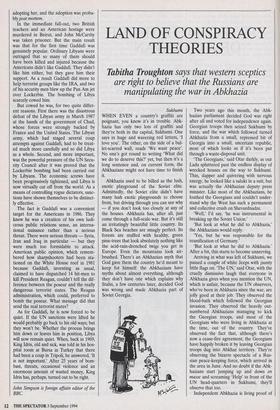LAND OF CONSPIRACY THEORIES
Tabitha Troughton says that western sceptics are right to believe that the Russians are manipulating the war in Abkhazia
Sukhumi WHEN EVEN a country's graffiti are poignant, you know it's in trouble. Abk- hazia has only two lots of graffiti and they're both in the capital, Sukhumi. One says in huge and wavering red letters, 'I love you'. The other, on the side of a bul- let-scarred wall, reads 'We want peace'. No one's got round to writing 'What did we do to deserve this?' yet, but then it's a long sentence and, on current form, the Abkhazians might not have time to finish it.
Abkhazia used to be billed as the lush, exotic playground of the Soviet elite. Admittedly, the Soviet elite didn't have many lush exotic playgrounds to choose from, but driving through you can see why — if you don't look too closely at any of the houses. Abkhazia has, after all, just come through a full-scale war. But it's still an irritatingly beautiful little cotuttry. Its Black Sea beaches are smugly perfect. Its forests are stuffed with healthy, green pine-trees that look absolutely nothing like the acid-rain-drenched twigs you get in Europe. Even the mountains look air- brushed. There's an Abkhazian myth that God gave them the country he'd meant to keep for himself: the Abkhazians have myths about almost everything, although they don't have one which explains why Stalin, a few centuries later, decided God was wrong and made Abkhazia part of Soviet Georgia. Two years ago this month, the Abk- hazian parliament decided God was right after all and voted for independence again. Georgian troops then seized Sukhumi by force, and the war which followed turned Abkhazia from a small, repressed bit of Georgia into a small, uncertain republic, most of which looks as if it's been put through a waste-disposal unit.
'The Georgians,' said Otar darkly, as our Lada spluttered past the endless display of wrecked houses on the way to Sukhumi. Thin, dapper and quivering with nervous energy, he looked like a saluki in a suit, but was actually the Abkhazian deputy press minister. Like most of the Abkhazians, he loathed the Georgians and couldn't under- stand why the West has such a permanent and collective crush on Shevardnadze.
'Well,' I'd say, 'he was instrumental in breaking up the Soviet Union.'
'But look at what he did to Abkhazia,' the Abkhazians would reply.
'Yes, but he was responsible for the reunification of Germany.'
'But look at what he did to Abkhazia.' After a bit, this starts to become unnerving.
Arriving in what was left of Sukhumi, we passed a couple of white Jeeps with jaunty little flags on. 'The UN,' said Otar, with the cruelly dismissive laugh that everyone in Abkhazia gives when you mention the UN, which is unfair, because the UN observers, who've been in Abkhazia since the war, are jolly good at their job. They observed the blood-bath which followed the Georgian invasion. They observed the heavily out- numbered Abkhazians managing to kick the Georgian troops, and most of the Georgians who were living in Abkhazia at the time, out of the country. They've observed the fact that, although there's now a cease-fire agreement, the Georgians have happily broken it by leaving Georgian troops dug into Abkhaz territory. They're observing the bizarre spectacle of a Rus- sian peace-keeping force, which arrived in the area in June. And no doubt if the Abk- hazians start jumping up and down en masse and screaming 'Help' in front of the UN head-quarters in Sukhumi, they'll observe that too.
Independent Abkhazia is living proof of what is euphemistically known as Russian foreign policy, but Abkhazians are begin- ning to realise that they can't count on the living part. The Russians had a particularly cunning plan by which they backed Abk- hazia throughout the war. They waited until Shevardnadze was on his knees, blackmailed him into bringing Georgia into the CIS and then switched sides. Russia now has a cosy relationship with Georgia and an economic blockade against Abk- hazia. Despite such flagrant scheming, Russians are mediating in the current Abk- hazian-Georgian peace talks, not to men- tion providing the 2,000-strong peace-keeping force; all of which has been tacitly approved by the UN, and all of which means that the Abkhazians are now more nervous than a dog in a Korean restaurant.
'Things are very tense here,' hissed Liud- milla, an Abkhazian government employee, as we sat outside out a bombed-out café in Sukhumi. 'You must ask the Russians why they are here. You have to ask why they are spending so much money on coming here. You have to ask what will happen next.'
It seemed fairly obvious what the Rus- sians are doing: trying to get as much con- trol over their former territories as possible. Everyone knows that. The Abk- hazians are frantically saying that they were pressured into inviting the Russian peace- keepers in. They say that this isn't a peace- keeping force at all. But the Russian troops are behaving themselves at the moment and there's not a lot they can do about it. What's really worrying them is what hap- pens next.
You can't move an inch in Abkhazia without bumping into a conspiracy theory, and some of the ones the Abkhazians were coming up with were pretty horrible. Most of them hinge around the issue of the 250,000 Georgian refugees who are now camped out miserably in Tbilisi and around the Abkhaz border.
The Georgians want the refugees to return to Abkhazia — now, en masse, or else. The Russians, unsurprisingly, are backing the Georgians. The Abkhazian government, who think that around 90 per cent of the refugees fought against them in 'We've found traces of slugs and snails and puppy-dogs' tails.' the war, have the despairing air of some- one caught between a double-glazing sales- man and an electric fence.
'If they come back, there will be war again,' said Stanislav Lakoba, the Abk- hazian Vice-President. Given that if the refugees return, the Abkhazians will sud- denly be reunited with the next-door neighbours who recently murdered, raped and tortured them — and vice versa — he was almost certainly right. 'It is too soon. The scars are too deep.'
He didn't sound threatening about it, just unhappy — which, as the Georgian refugees outnumber the Abkhazians by about two to one, was understandable. 'There has been no peace agreement signed,' he continued, which is true. 'When have refugees ever been returned before a peace agreement was signed?'
Even the UN admitted this could be seen as strange. Abkhazian paranoia may be running at record levels, but when they say that Russia doesn't want an indepen- dent Abkhazia, because otherwise all the little bits of Russia no one's ever heard of will start claiming independence too, they're probably right. When they point out that the easiest solution for Russia and Georgia would be if the Georgian refugees returned and disposed of the Abkhazians, it's difficult to argue. And without Russian backing, which this time they won't get, the Abkhazians don't stand a chance.
'You must talk to the Russians,' the Abkhazians kept saying, but the Russians persistently refused to talk. We kept trekking to the Russian headquarters to plead for information. Could I interview the commanders? No. Could I talk to the peace-keeping forces? No Could I just see the peace-keeping zone, if I promised not to talk to anyone in it? No. Nyet. Not pos- sible. Come back next week. We have our orders. Sony.
In the end, Nani, my interpreter, and I decided to go ahead anyway. We ambushed the commander of the peace- keeping forces in front of his headquar- ters. We visited the Abkhazian front line, which consisted of 11 scruffy soldiers in home-made uniforms, a mattress, a burnt- out car, bomb craters of assorted sizes and a small dog. The soldiers gave me an apple and told us that they hated the Georgians, but were really civilised people. We asked them what would happen if the refugees came back now, and they looked scared.
We sneaked into the peace-keeping zone disguised as Abkhazian journalists, and Nani finally persuaded a Russian major to talk to us. We sat in the pouring rain underneath a rusty metal umbrella in the centre of Gali — a depressing cross between a ghost town and a bombsite — while the major, who was fed up with everything and wanted to leave the army anyway, told us about Russian strategy. The whole area, he said, was vitally impor- tant to Russia because Georgia borders on Russia's old enemy, Turkey. That was why the troops were there. This directly contra- dicted the official Russian line, but it didn't seem to worry him. We then asked him about the refugees and he said they'd have to be mad to return. 'I wouldn't,' he added.
After all this, two things had become clear: one, western sceptics are absolutely right about the Russians manipulating first the war, and now the peace-keeping opera- tion, to get their own way. The Russian commander admitted that he would never hand over control of the operation to the UN, even if the UN wanted it. His deputy admitted that, despite Russian claims that this is a CIS operation, the CIS have no control over it either.
Secondly, the West should be worried about this. But they should also start wor- rying about what happens if they stand back and allow the next stage — the return of the refugees — to go ahead without proper safeguards. They needn't worry, however, as much as the Abkhazians should.
Just before I left Abkhazia, some Abk- hazians confided, in an embarrassed sort of way, that during the war they'd sacrificed a goat to ask the gods for victory. They didn't start the war, although everyone tends to forget this, and they're now saying that their only hope is for the West to condemn Georgia and give Abkhazia some kind of legitimate standing. Georgia would then have to back off, and Russian plans for complete control of the area would be scuppered. 'Otherwise,' everyone kept say- ing, 'we have no future. What do you think? Will it happen?'
`How many goats have you got?' I said.




























































 Previous page
Previous page